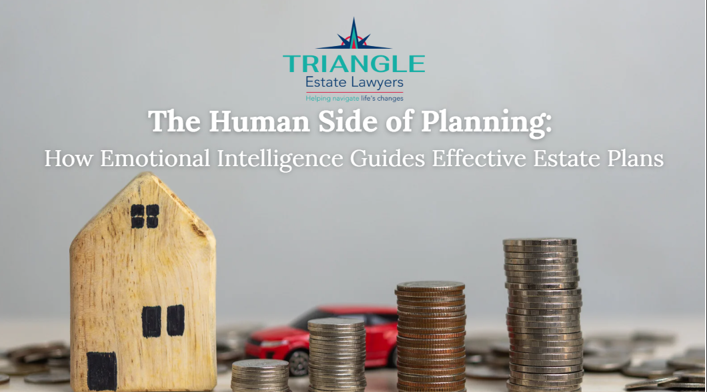Estate planning with emotional intelligence helps families make thoughtful, values-driven decisions—not just financial ones. At Triangle Estate Lawyers, we know that effective estate planning is about more than just documents. It’s a deeply personal process shaped by emotions, relationships, and legacy. As a result, we believe emotional intelligence—including empathy, self-awareness, and social skills—is essential. According to Verywell Mind, these traits help legal professionals support clients with both compassion and clarity. Consequently, estate planning becomes more client-focused and emotionally aware.
That’s where emotional intelligence (EI) plays a powerful role. By using EI, estate planners help clients make informed decisions while honoring their relationships and long-term wishes.
Why Emotional Intelligence Matters in Estate Planning
Estate planning with emotional intelligence allows attorneys to move beyond transactional advice and build meaningful, trusting relationships with clients.
Here’s how EI improves the planning process:
- Client Comfort and Openness
Clients are more willing to discuss deeply personal issues—such as estranged family members, blended families, or non-traditional relationships—when they feel understood and respected. - How Emotional Intelligence Reduces Conflict
In many cases, estate planning reveals or revives family tension. A planner with strong EI can help families navigate disagreements with calm, objectivity, and empathy. - Addressing Complex Family Dynamics
Families with stepparents, aging loved ones, or adult children with disabilities often benefit from a personalized and sensitive approach. EI helps identify the emotional layers behind each planning decision.
Key Emotional Intelligence Skills for Estate Planners
Active Listening
More than just hearing what’s said, active listening helps uncover the motivations and concerns that often influence planning decisions.
Empathy
An empathetic approach allows planners to connect without judgment, providing reassurance through difficult conversations.
Neutral Facilitation
Whether mediating disagreements or addressing competing interests, a neutral and emotionally aware approach helps families reach peaceful solutions.
Real-Life Example: Blended Families and Estate Wishes
Consider a widow with adult stepchildren and biological children. Her desire to leave a larger share of her estate to her biological children may create tension or guilt. An emotionally intelligent estate planner can help her express these wishes in a respectful, thoughtful way—while minimizing potential disputes and ensuring clarity. The ABA also emphasizes that emotional intelligence can lead to more durable, client-centered plans in high-stakes legal settings (American Bar Association)
The Result: Plans That Work in Real Life
As a result, estate plans built with emotional intelligence are more than legally sound—they’re personally meaningful. Ultimately, they reflect the client’s true intentions, anticipate potential challenges, and create a smoother path for loved ones.
At Triangle Estate Lawyers, we bring both legal knowledge and emotional insight to every client relationship. We guide families through the estate planning process with empathy, clarity, and care—because protecting your legacy means understanding your values.
Call 919-851-3717 or schedule a confidential meeting with our team to start your plan today.

